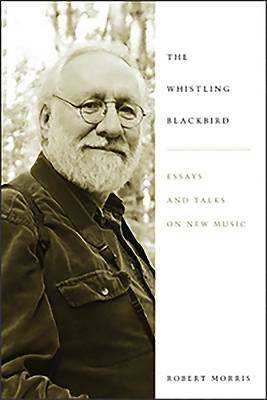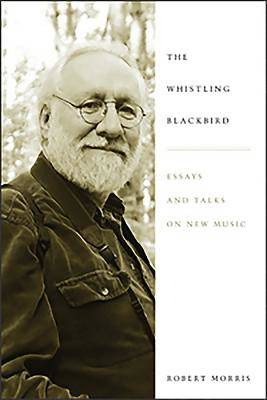
- Afhalen na 1 uur in een winkel met voorraad
- Gratis thuislevering in België vanaf € 30
- Ruim aanbod met 7 miljoen producten
- Afhalen na 1 uur in een winkel met voorraad
- Gratis thuislevering in België vanaf € 30
- Ruim aanbod met 7 miljoen producten
Zoeken
Omschrijving
A collection of essays on new music, composers, and issues in American music criticism and aestheticson by composer and music theorist Robert Morris. The Whistling Blackbird: Essays and Talks on New Music is the long-awaited book of essays from Robert Morris, the greatly admired composer and music theorist. In these essays, Morris presents a new and multifaceted view ofrecent developments in American music. His views on music, as well as his many compositions, defy easy classification, favoring instead a holistic, creative, and critical approach.
The Whistling Blackbird contains fourteen essays and talks, divided into three parts, preceded by an "Overture" that portrays what it means to compose music in the United States today. Part 1 presents essays on American composers John Cage, Milton Babbitt, Richard Swift, and Stefan Wolpe. Part 2 comprises talks on Morris's music that illustrate his ideas and creative approaches over forty years of music composition, including his outdoor compositions, an ongoing project that began in 1999. Part 3 includes four essays in music criticism: on the relation of composition to ethnomusicology; on phenomenology and attention; on music theory at the millennium; and on issues in musical time.
Threaded throughout this collection of essays are Morris's diverse and seemingly disparate interests and influences. English romantic poetry, mathematical combinatorics, group and set theory, hiking, Buddhist philosophy, Chinese and Japanese poetry and painting, jazz and nonwestern music, chaos theory, linguistics, and the American transcendental movement exist side by side in a fascinating and eclectic portrait of American musical composition at the dawn of the new millennium. Robert Morris is Professor of Music Composition at the Eastman School of Music, University of Rochester.
The Whistling Blackbird contains fourteen essays and talks, divided into three parts, preceded by an "Overture" that portrays what it means to compose music in the United States today. Part 1 presents essays on American composers John Cage, Milton Babbitt, Richard Swift, and Stefan Wolpe. Part 2 comprises talks on Morris's music that illustrate his ideas and creative approaches over forty years of music composition, including his outdoor compositions, an ongoing project that began in 1999. Part 3 includes four essays in music criticism: on the relation of composition to ethnomusicology; on phenomenology and attention; on music theory at the millennium; and on issues in musical time.
Threaded throughout this collection of essays are Morris's diverse and seemingly disparate interests and influences. English romantic poetry, mathematical combinatorics, group and set theory, hiking, Buddhist philosophy, Chinese and Japanese poetry and painting, jazz and nonwestern music, chaos theory, linguistics, and the American transcendental movement exist side by side in a fascinating and eclectic portrait of American musical composition at the dawn of the new millennium. Robert Morris is Professor of Music Composition at the Eastman School of Music, University of Rochester.
Specificaties
Betrokkenen
- Auteur(s):
- Uitgeverij:
Inhoud
- Aantal bladzijden:
- 442
- Taal:
- Engels
- Reeks:
- Reeksnummer:
- nr. 80
Eigenschappen
- Productcode (EAN):
- 9781580463492
- Verschijningsdatum:
- 1/12/2010
- Uitvoering:
- Hardcover
- Formaat:
- Genaaid
- Afmetingen:
- 167 mm x 240 mm
- Gewicht:
- 830 g

Alleen bij Standaard Boekhandel
+ 515 punten op je klantenkaart van Standaard Boekhandel
Beoordelingen
We publiceren alleen reviews die voldoen aan de voorwaarden voor reviews. Bekijk onze voorwaarden voor reviews.











